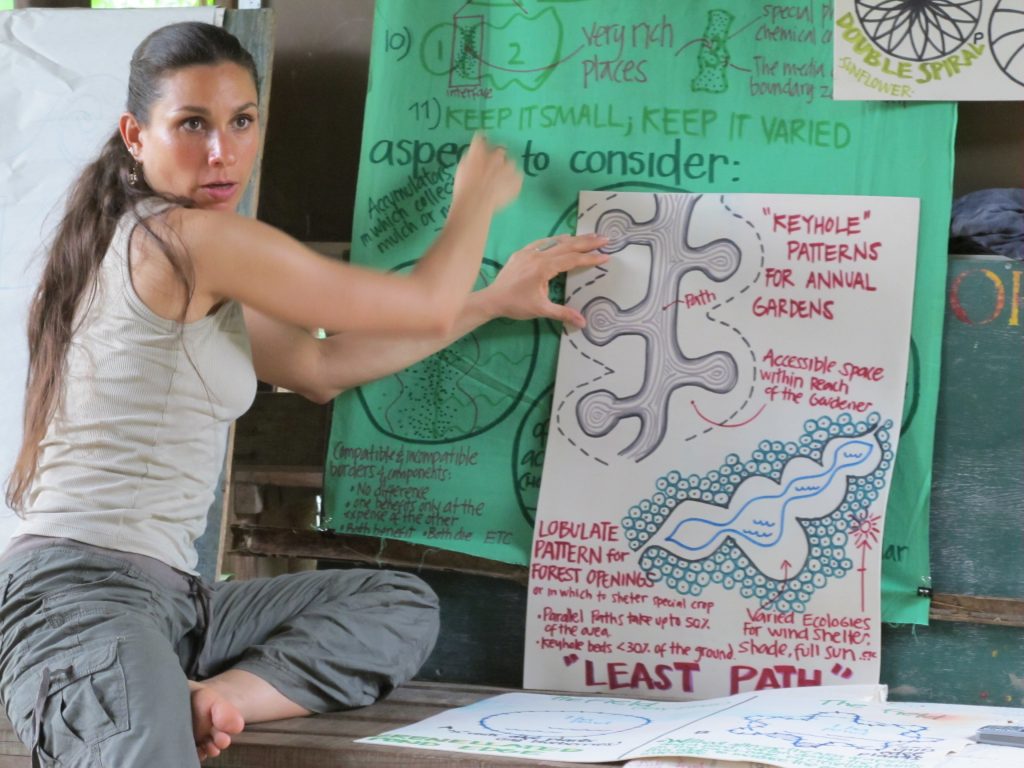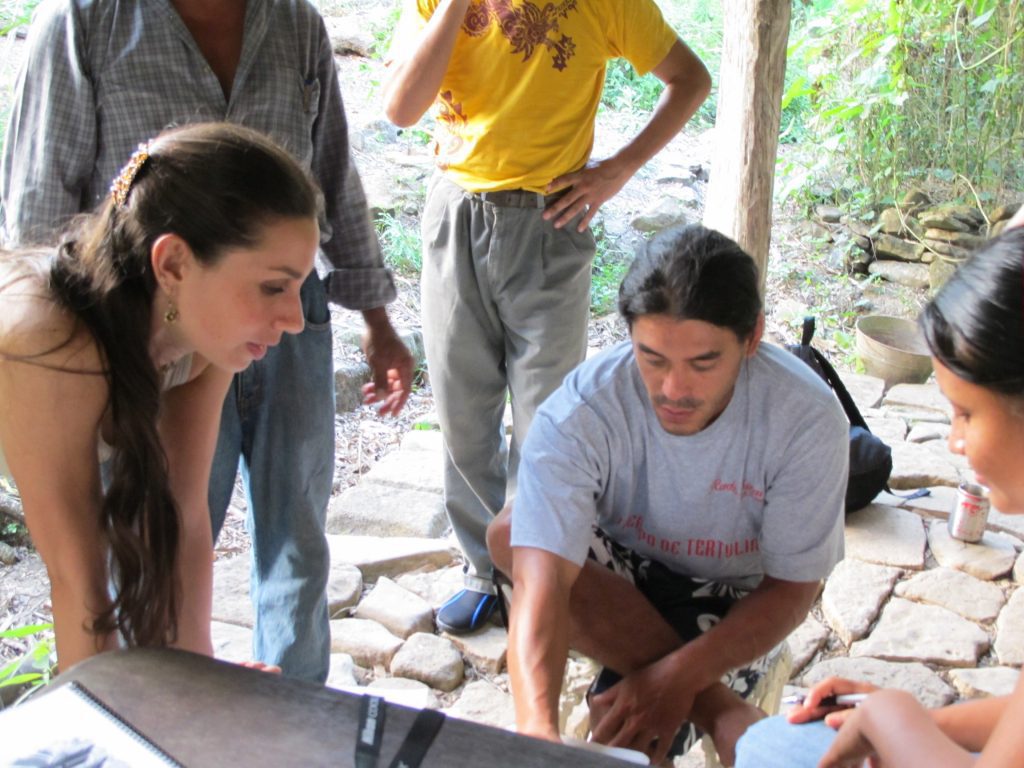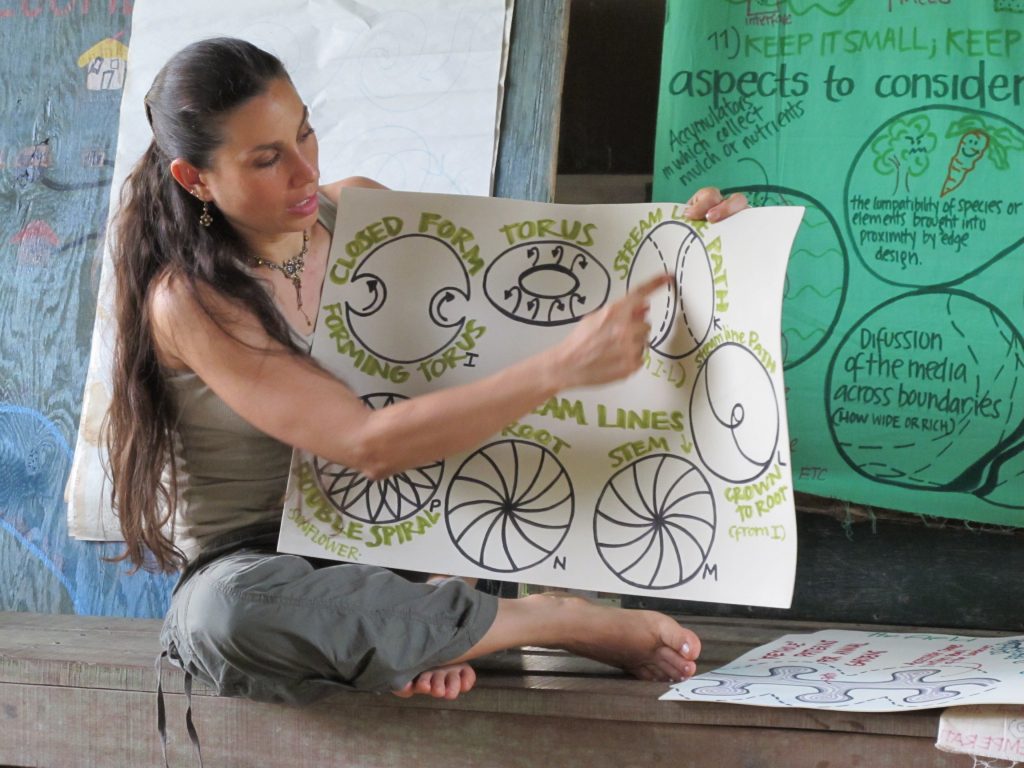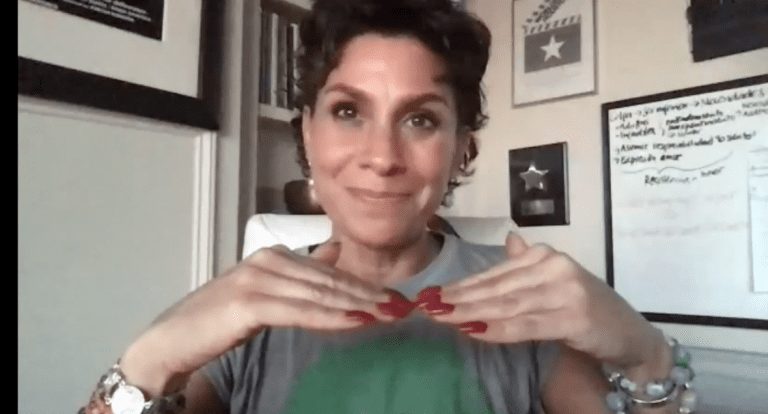The Backstory
Ten years ago in the Maya Mountains of Belize I attended a permaculture design course with author, public speaker and self-described “Emergency Planetary Technician” Albert Bates and an impressive young colleague, María Ros. María, I learned, is a permaculture designer with a whole other profession: she’s a psychotherapist, and her passion for the two areas of thought have led her to develop a series of practices and tools that she calls Inner Ecology. I interviewed her about the innovative concept and was personally moved by her story and her blend of land-based wisdom and insights about the human psyche. She spoke of the tendency that we passionate Earth-oriented types have to neglect our own inner environments as we pour our energies — often unsustainably — into the outer one.
I never got around to sharing that interview, however. I transcribed it and told the story of our meeting in my still unpublished book manuscript, and we stayed in touch over the years. But it wasn’t until I caught a live streamed Inner Ecology event that she held on Facebook recently that I remembered the interview, and we began talking about reviving it and finding new ways to collaborate.
Now, in honor Maria’s collaboration with The Esperanza Project community, I share with you that video and the transcript of that interview — long ago, but as relevant and timely as ever — from the mountains of Belize. Enjoy — and I hope to see you on Saturday!
Your new book has the theme Inner Ecology. What does Inner Ecology mean and how did you come to this idea?
That is the title that I want the book to have and it is just the whole concept of being able to find these internal cycles of evolution and understand ourselves as an entire ecosystem, each of us as humans – and to be able to recognize among ourselves what cycles, what relationships exist between each one of those elements in the cycle. Its temporality, its way of being, its specifications. and then likewise to be able – just like permaculturists, we see the Earth and we study it and we observe it and we respect it in its cycles, and we understand each of its cycles. We can also do that with our heart, with our emotions, with our thoughts, our sensations, the way we understand ourselves.
How did I arrive at this concept? I think that every day I keep coming to this concept. (laugh) But actually, I studied several careers including corporal psychotherapy and permaculture, and I think it’s not just about trying to get people to respect what’s outside and love what’s outside, but to be congruent. To love yourself, to respect yourself, to know yourself, makes you much freer, and turns out much more naturally, with respect to nature, if you do it as a consequence of this internal work.

Can you give me an example of this?
An example of this. hmmm … an example of respect. OK. Normally we teach children to respect nature. Why? Because it’s beautiful, because … that’s what you’re supposed to do. But how can I get to that respect?
Within me I have emotions, which I am not normally accustomed to accepting, which I don’t necessarily want to see, to touch. Because sometimes it hurts me, because sometimes they are not so pleasant, because I don’t know how to be able to flow with them. So to the extent that I can touch my heart and say — OK, this hurts me — I can respect what hurts others. I can respect that something can hurt nature, too.
If I can understand my own anger, I can accompany others when they are angry. I can also accompany nature when it reacts in a way that I consider surprising, or violent, that I consider violent. So I think that to the extent that we can contact our heart, contact our emotions and accept them as they are, and accept others where they are, as they are, without taking it personally, we can also flow in our relationships, with ourselves, with others, and with the Earth.
And how can we understand our own inner, and how can we design it in a useful way?
Well, there are several steps. In the manual that I am writing there are several methodologies. but I think the basis of everything is first, stop, allow yourself to stop, allow yourself to remain still, even if you do not do anything – because our culture tells us that if we do not have a full agenda, then we are nothing. To be able to stop and take this time to contact myself to see what I am feeling, what is happening to me.
After observing it, can we recognize what the cycle is? What is the movement? What is needed there? Oh, I’m feeling something strange in my heart. Is something happening to me or in me? What is it? Maybe I don’t know what it’s called but I know how it feels.
Then I watch it carefully. Observe the cycles that I have, the temporality, how this is moving within me, and what is it that I would need so that it can move in a more organic way? And obviously when I come to know that, I can recognize in me what is mine. So I can be held responsible for it.
Therefore, I am empowered by the responsibility that I take for things, that I feel, and that I am, only I am. It empowers me, and gives me the necessary strength to keep going to take action to reach a moment of anagnorisis, of understanding. Of what is happening — and then I can respect myself in my emotions, and also respect what is outside.

How have you transcended your challenges in the design of your own inner ecology?
I think it has been organic to write this – I have been writing methodologies and teachings for twenty years now. And this has been the longest and juiciest of all — because I see when I stop that it is because it is a part that I have not solved in me, and I cannot continue writing until I transcend it. So it has taken me much more time than I thought it would. But I think it is much more real and consistent what I write if I have already passed through those stages that I write in the book, no? and not just write down what I imagine I could do, and what someone could achieve.
So I have met many challenges. I also have many emotions that are still stuck. I am a psychotherapist and as such we have an oath that all the time we are in a therapeutic process, we have our therapists, and every day we are working with our emotional blocks with everything we have. However, it has been very consistent to continue writing to the extent that I transcend what I am telling others to transcend.

Can you give me an example?
Yes. We all have many comfort zones, places where we feel safe and calm – and we do not move because we are well there, right? and we think that we do not need to move. And it has touched me to leave that comfort zone, to work with my fear, to work with my anger. Even now I am going through this stage of overcoming my belief that all this that I believe, all this that comes from here inside, it’s worth it, I can touch the hearts of people, no? Suddenly I see what is happening, and I am surprised, I marvel; and when someone else says hey, congratulations, you’re a great teacher, I still have trouble saying yes, yes, yes, I’m a great teacher.
So I am still in this process of believing in this God that I am also, that grows in me, that manifests every day – through culture, though education, through fears, through thousands of things.
Do you see implications of this study on a social level?
Of course – I believe that the more we all touch our hearts, the better – and healing them, not just touching them. Because it is not just about touching, seeing and running, right? Because suddenly it can be worse, just to touch it and know that it is terrible or that it feels bad, and so you better not go back there.
But when someone touches her heart and heals it – either on this path or this process of healing, and one by one, each of the areas she needs to heal – she is a much more sensitive person, much more open, much more congruent, much more real.
Because it is one thing to love the Pachamama and want everything to be good, and feel pain for what happens, in order to feel this nostalgia. But it’s another very different thing to really be able to flow with that and let it be here inside and accept myself as I am, and accept everything outside as it is.
I believe that if human beings could each dedicate themselves to heal our own hearts we would have a healthier life, and also our relationships would be much healthier. There would not be so many divorces – divorces of the plants from me, of the animals from me, of the environmental from me. And we would live much more in unity, and obviously our lives would flow more easily, and our growth would be much more organic.

- ‘Planting Is a Right’: Guadalajara’s Urban Ag Rebels Rally Against Proposed Regulations — Again - January 21, 2026
- The women who kept a Mexican pueblo above water — and stopped a megadam - January 15, 2026
- Reading the Earth: How Mexican scientists are using nature to find the disappeared - January 7, 2026
Inner Ecology Maria Ros Permaculture psychology self-care wellbeing
Interesting concepts .looking forward to participate in the upcoming talk with her . thanks for the invite ! Regards ..
Thanks so much, Hugo! It will be great to see you there.